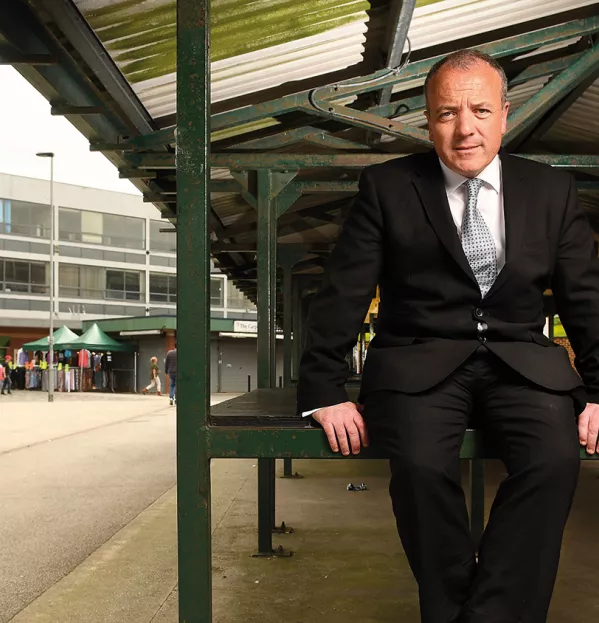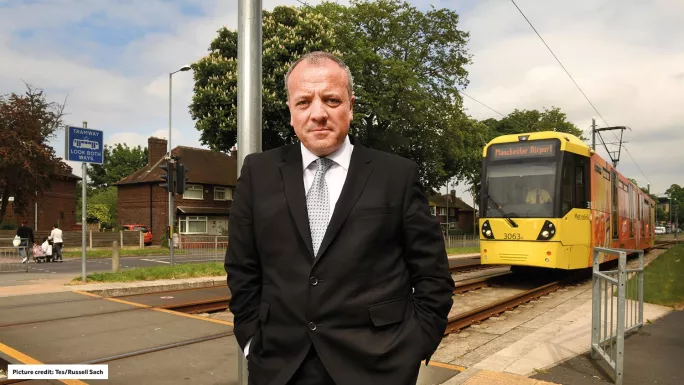‘I taught 1,000 children. It’s nice to see them as adults saying they will vote for me’

Any MP worth their salt is well acquainted with their community’s institutions: the hospital, the library, the local parks.
But there can be few national politicians who are as familiar with their local schools as Mike Kane.
The Labour politician - who is fighting for re-election in the Greater Manchester seat of Wythenshawe and Sale East - is not just the shadow schools minister. He worked as a primary teacher in the constituency for eight years and was educated there himself.
That familiarity is immediately evident when Tes joins Kane on the general election campaign trail, just four days before the Manchester bombing.
Entering an art room during a tour of St Paul’s Catholic High School, he smiles as he breathes in the aroma of chalk, paint and Pritt Stick.
“There’s always a smell in art lessons,” he remarks wistfully.
St Paul’s is a local secondary school that is on the road to recovery after being rated “requires improvement” in 2016. It has a deeper resonance for Kane, who used to be a pupil there.
Physically, it’s changed a bit since his day, as he’s keen to point out. Walking into a high-ceilinged, modern science room, he quips: “This is when I tell the Tes journalist, ‘You can tell it’s a Building Schools for the Future [New Labour’s building scheme].’”
The son of Irish immigrants, Kane was brought up in a two-bedroom council house in Wythenshawe. He says his school days were happy ones, but doesn’t gloss over the fact that he grew up during “difficult times”.
He was caught up in the Poundswick dispute in 1985, when schools in Manchester were convulsed by industrial action over pupil behaviour.
Kane recalls “sort of wondering why teachers were going on strike”.
“But we were well into a Tory government that had massively underinvested in our schools and they were crumbling edifices, basically. We don’t ever want to go back to those days,” he says darkly.
Political awakening
However, Kane’s political awakening was really the result of events much closer to home. When he was still at primary school, his mother, an auxiliary nurse in the NHS, developed multiple sclerosis. He remembers being a “latchkey kid”, returning to an empty home after school while she was receiving treatment.
“I saw her go from being a fit, hard-working woman to one reliant on a wheelchair and benefits in a very short space of time,” he says. “That radicalised me, in a sense, about how the world treated disabled people.”
Kane left school with a “handful of O levels” to follow his father into the building trade.
“I think one winter it got so cold that I thought, ‘I can’t do this for another year’,” he says.
With the clear intention of becoming a teacher, further education provided a springboard to an undergraduate degree and PGCE, and he started out at Springfield Primary School in 2000. He recalls his eight years there fondly: “It was just a brilliant school...it did remarkable things.”
But Kane was presented with a crossroads in 2008. Having served as a Manchester City Councillor for years, he was offered a job running the constituency office of the Labour MP James Purnell.
“The choice I faced was did I go into [school] management, which I could have done, or did I take an opportunity to go into politics? I thought, ‘I’ll always have the teaching’, so I just took the break.”
Kane says he never intended to be an MP. But when the death of sitting MP Paul Goggins triggered a by-election in Wythenshawe and Sale East in 2014, he put himself forward in a bid to head off an attempt by Ukip to snatch the seat. He won convincingly.
On the school visit, you can tell Kane is from the community. He knows the first names of St Paul’s governors and school leaders. Halfway through the tour, a male teacher stops him in the corridor for a quiet word. Later, a woman informs him: “My brother went to school with you.” (“Anthony? He’s an engineer, isn’t he?”)
While he hasn’t worked in a school for nine years now, when asked whether he still considers himself to be a teacher, Kane’s response is immediate: “Yes.”
His assistant agrees. “He puts smiley faces and ‘vs good’ on my work,” she laughs.
Kane believes his two careers are interlinked. “I think people should live life and live it to the full and sometimes we need our teachers to help us to do that,” he says. “I reflect in politics that everybody is full of potential and it’s how you help people maximise their potential.”

More practically, his years in the classroom have provided him with invaluable experience for the daily grind of holding the government to account as shadow schools minister.
That insight is most apparent when Kane is discussing last year’s key stage 2 Sats.
“It wasn’t just the exemplar material was out so late - the key issue was that there wasn’t enough exemplar material,” he says with exasperation.
“You’re letting down a whole generation who’ve gone through a primary school when you’re leaking the spelling test and you’re not giving the teachers the support to implement the new curriculum.”
Kane says the stress generated by the debacle was so great it “led to one or two of my colleagues actually leaving the profession - and they were some of the finest teachers in the land”.
On Labour’s plans, he says the schools system must be “democratically accountable”.
However, the party’s manifesto stopped short of saying schools should be returned to local authority control - an omission which caused surprise among some commentators, given the party leadership’s vehement criticism of free schools and academies. Kane says such a commitment would have made “the same mistake by dictating from the top.”
But he remains vague on exactly what form Labour’s new democratic oversight would take - although he suggests metro mayors could play a role.
Kane is similarly woolly on reform of the wider accountability system. He says parents should have “real-time information about how their schools are performing”.
But when asked how this would be delivered in practice, his response is broad-brush - “school collaboration” would determine how such real time information systems would work.
The big issue
However, as far as the election is concerned, Kane is adamant there is just one big education issue: school funding.
“Schools are at the heart of every community,” he says. “£3 billion of government cuts coming down the line will rip the heart of communities out. People have a choice.”
After the St Paul’s visit, Tes follows Kane to Newall Green Primary School, where he hands out flyers at the gate with the amount of money the school is forecast to lose: £242,190 by 2019.
“This is the cut to this school,” he says emphatically, as he passes out another flyer to a parent hurrying past to collect their child.
Given his background as a teacher and current brief, it makes sense that Kane has put funding at the heart of his campaign.
And it seems to be cutting through. “You can’t function without the teaching assistants can you?” says one worried mother.
“I’ve read about this,” says another.
Apathy occasionally rears its head - “no, not bothered,” says one lady pushing a pram - but many of the parents say they will back Kane. “You get my vote. The Conservatives - I hate them,” says a man in sunglasses and a tracksuit.
Kane says he’s been getting a good reception on the doorstep: “I taught a thousand children in Sale, so it’s nice to see the children who are now adults coming out to say they’ll be voting for me and they remember the trips.”
He’s upbeat about Labour’s prospects in the general election and says that it would be a “great honour to serve Her Majesty as a schools minister”.
“We’re closing in all the polls. I still think there’s a very large mountain to climb…[but] I’m optimistic that we have a chance.”
You need a Tes subscription to read this article
Subscribe now to read this article and get other subscriber-only content:
- Unlimited access to all Tes magazine content
- Exclusive subscriber-only stories
- Award-winning email newsletters
Already a subscriber? Log in
You need a subscription to read this article
Subscribe now to read this article and get other subscriber-only content, including:
- Unlimited access to all Tes magazine content
- Exclusive subscriber-only stories
- Award-winning email newsletters